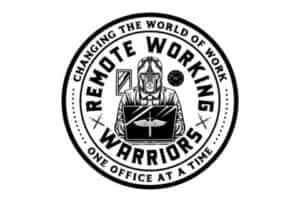This website is supported by its readers. If you click one of my links I may earn a commission. I am also a participant in the Amazon affiliates programme and I will also earn a commission from qualified purchases.

One of the biggest worries I had when I first started working from home was how productive and focused I would be. I mean at the end of the day with all the distractions around my home environment and no dedicated space to work, would I get anything done? With almost 12 million employees going to be fully remote by 2020 deciding what is better remote working or working from an office is becoming more important than ever.
Working from home from a designated office space is a better option than working from a traditional office than you commute too. Remote workers on average work 16.8 days or 1.4 days more per year than their office based counterparts and can save an organisation on average $13000 per year per employee. Remote employees also report lower stress brought about from the commute or other office based activities.
Too much working from home however can cause issues with simulation and can cause the lines between work and home blend. As such the best option would be a mix of working remotely and working from home.
A mix of 3 days at home and 2 days in the office work best for almost any role
So why exactly is working from home better than working from the office? And what are the benefits and drawbacks of both? Keep reading to find out more.
(Now it’s worth mentioning that this post has a lot of information and so if you’re curious about the best equipment needed to work remotely simply go to my resource page here)
Work from home versus office
Before the start of this year a lot of us thought that whilst remote working permanently was something the world of work was trending towards it would not happen for some time.
Then came the pandemic that no-one saw coming and all of sudden workforces are rapidly evolving and changing to meet the needs of their newfound remote employees.
This change is leading to something like 8% more employees becoming remote workers every year
As such both employees and employers are now asking the question, working from home vs working from an office? Which is better.
Working from home is the best option when it comes to a workforce for both employees and employers when compared to working from an office space.
Employees benefit by saving money on the commute, having the choice of when and where they want to work and get a sense of responsibility that they would not feel when compared to working from an office.
Employers benefit from remote working by saving as much as $13,000 per employee when they work remotely, saving money on costs like heating and lighting and also have a much more flexible workforce that are able to work around the clock.
That being said there are also some significant drawbacks for both employees ( lack of social interaction) and employers (lack of a real company culture) n
So to help break down how both working from home and office working compare to one another I’ve put together a table comparing both against a few key parameters.
|
Factor |
Working from home |
Traditional office space |
| Productivity | 16.8 days more per month then office based workers | Three hours per day or 12.5 hours per week. |
| Cost | Lower cost for the commute for employee, lower cost on bills for employer, higher cost on bills for employee | Higher cost on commute for employee, higher cost on bills for employer |
| Communication | Less communication that is done less frequently | Instant communication f, face to face with stronger data exchanges |
| Isolation | Higher feelings of isolation and loneliness (45%) | Lower rates of isolation at (25%) |
| Timings | Employees are flexible to work around the clock and at their own discretion | Office based employees usually need to leave at set hours or when their offices close |
| Sensitive data | Employees can handle sensitive data working from home | Employees can handle sensitive data when working from an office |
| Work life balance | Employees are free to manage their own time and have a better work life balance | Not being able to work when they want is often the biggest gripe for a number of office based employees. |
| External events/pandemic | Employees Working from home is a versatile way of noto getting caught up by external events | Traditional offices will likely have to close during any important events |
| Staying healthy | Remote workers are likely to have poorer health and be less fit the they would in an office | By nature of commuting and walking around an office on a basic nature, office based employees are likely to be healthier. |
| Roles | Any role that is digital can now be done remotely | Roles specific to the office can only be done in the office |
Let’s explore these factors below in more detail and see which comes out on top:
Productivity
Single handedly the biggest worry both employers and employees have around remote working is if they will be productive when working from home.
Whilst perception is that remote workers will do anything but work if given the chance, the truth is in a recent study by Airtasker that remote workers one average work for 16.8 days more per year then their remote working counterparts.
Now If you compare this with traditional office workers they are only productive for about 12 hours per week meaning that organisations are losing thousands of hours per year in lack of productivity by not giving their employees the option to work remotely
My study on working from home vs the office productivity
One of the things I wanted to test out then was if this was true or not and so decided to do my own experiment over a two week period analysing if I was more or less productive when i worked from home compared to working from an office.
What role did I do my study on?
Before we go into how I set up my study, we need to talk about what my day to day role is.
I currently work in sales. Now whilst some sales roles often find you not being in control of your schedule, having paid my dues in the world of business development consultancy. Account executive roles My current role is that of a business development rep aka a sales rep.
This means that unlike other sales roles I don’t necessarily need to be out visiting clients instead my role is mainly focused on calling and making first contact with clients.
This means typically week in week out I can do the same activities and monitor my activity level.
How did I set up my study?
I decided to set up my study over a two week period, Week one would be based in the London head office of my firm. I would stay over at a friend’s house and arrive there on a Sunday to ensure I did not waste any time travelling on a Sunday and would leave after work 5 pm on a Friday.
Week 2 would be based entirely at home, I would work for the exact same amount of time as I would normally instead of taking breaks away from my office day.
I would track all of my day to day activities in a CRM platform ( Salesforce). On top of this, I chose to do this in the weeks that were identical to one another, so the same amounts of meetings, no external distractions like big events or days when the organisation had special activities taking place.
What does a typical week look like
So the key KPIs of my role consists of picking up 6 leads from our research team per week, hammering out 200 activities split typically 50/50 between calls and e-mails.
I would also have to do other activities that would not usually be tracked via SF such as recording videos for prospects. Another area I would need to track would be activities I would get around to if I had spare time such as posting on LinkedIn or coaching calls.
The main metrics then we will be:
- Number of leads picked up
- Total numbers of calls/emails/ activity completed per week
- Numbers of meetings booked
- Calls coached
- Posts on LinkedIn
The results
Week 1 – working from an office
| Metric | Number of activities completed |
| Number of Leads picked up | 5 |
| total numbers of calls/emails/Li messages activity completed per week | 240 |
| Numbers of meetings booked | 1 |
| Calls Coached | 1 |
| Posts on Linkedin | 1 |
So this week was a bit of a mixed bag. Whilst I managed to have a much higher number of activities completed then I thought I would have I was a little bit disappointed by the number of Meetings booked vs the number of calls. Also the week as a whole was quite quiet and yet I only managed to coach one LI post.
The break down of activity for the 240 activities where as follows:
- 82 calls completed
- 1 meeting booked
- 17 Linkedin in mails sent
- 2 video cards sent out
- 135 e-mails sent
- 3 general task follow ups
Week 2 – working from home
| Metric | Number of activities completed |
| Number of Leads picked up | 7 |
| total numbers of calls/emails/Li messages activity completed per week | 310 |
| Numbers of meetings booked | 5 |
| Calls Coached | 4 |
| Posts on LinkedIn | 3 |
A much stronger week in week 2 of the experiment when working from home. Not only did my booking ration exceed( this is typically 1 meeting booked per 100 activities) but I also had more time to coach more calls and build up my social branding via LinkedIn.
The break down of activity for the 310 activities were as follows
- 128 calls completed
- 5 meetings booked
- 21 Linkedin inmails sent
- 5 video cards sent out
- 150 e-mails sent
- 1 general task follow up
What do these results mean
To cut to the chase, The results of my study show that for my sales role at least, over the period of a short time scale of two weeks working from home is unequivocally more productive than working from home in an office environment.
To read up my full post about this you can check it out here.
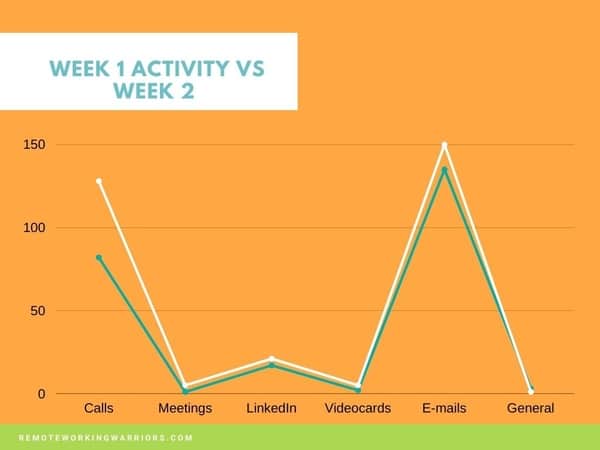
The verdict: Working from home
Cost
Working from home also has the unique benefit of saving employees aka me and you a bunch of money on the commute.
I was working out the amount of money spent per year when I used to commute and it was around $1000 per year just getting in and out of work let alone the time cost wasted working from an office.
Working from an office you will spend more money on the commute although there are some benefits to cost savings. For example most offices have free fruit or snacks as a way of attracting the best employees possible, you also won’t be spending as much money on things like electricity and phone bills although the savings of these costs are likely to be marginal.
Working from home as opposed to an office will also mean you are less likely to eat your lunch in restaurants (or takeaways if you’re anything like me) saving you a fair bit per year in cost saving.
Employers too can benefit significantly on costs with some estimates put the cost of having someone in an office being around $ 13000 per employee.
The verdict; Working from home
Communication
One of the biggest benefits working from an office has going from it is the instant communication and feedback you get when working on a project.
I mean we’ve all been situations working remotely when you need the answer to a difficult question or problem you are struggling with only to find your colleagues are unresponsive to your instant messaging or calls.
This can cause a severe delay in you getting your job done.
With more of is working remotely this poor communication when working from home is increasing with apps like slack helping bridge the gap, however there is nothing better then face to face communication which has been proven to have better data exchanges with almost 70% of communication being non-verbal.
The verdict; Working from an office
Isolation
The other major thing that working from an office has going from it is the social interaction you get.
For those of you who even dislike your colleagues you will likely want at least some form of social interaction per day on account of being a human being.
Working from home cuts off a lot of this social interaction which can be potentially damaging to your health with 45% of remote workers feeling more isolated working from home.
Again, whilst this is changing with the trend towards remote working, isolation is likely one of the biggest factors remote workers face.
The verdict: Working from an office
Timings
Remote workers or people working from home have the ability to work from their offices whenever they feel the need and if done correctly can successfully balance their life admin with their jobs.
This is a huge benefit to those who are night owls or prefer walking to the beat of their own drum.
Working from an office still allows you to work at your own discretion with schemes like flexitime however this is often limited with the degree of flexibility that you have and so unto you will often need to work with some variance of the 9-5.
The verdict: Working from home
Sensitive data
Both working from home and working from an office are suitable to handle sensitive data so long as you have control of your environment.
Most people need to adhere to strict data sensitivity laws like GDPR and so ensuring you keep up to date with your information security team will be super important.
Unlike co-working spaces most people working from home are in control of their environment so should have no issue in accessing sensitive data.
It goes without saying that if you are working from an office it will be up to your employer to ensure all information is managed in a secure way so this one comes out to a draw.
The verdict: Draw
Work life balance
Not needing to travel via a commute every day or being in control of your social life are two of the major benefits remote working has going for it when compared to office work.
Office workers typically can’t step out to take care of their duties or get major pushback for things like lying in bed for longer than they would normally want to.
The verdict: Working from home
External events/pandemic
If you told anyone at the start of last year that there would be a pandemic so bad it would literally shut down the world for almost an entire year you would have been laughed out of the room you were in.
Then comes 2020 and all of a sudden employees and employers are needing to find a way to adapt to external factors that could disrupt their ability to work.
With climate change, an unstable economy and bath weather likely to be with us for the next few years working from home would be the best option in dealing with these external events.
This is because in the event of any of the above, working from a traditional office would likely be closed in the event of severe weather or a pandemic.
There are still some external factors to watch out for when working from home. For example DB recently proposed to pay remote workers less than office workers which could impact the career prospects for said remote workers.
The verdict: Working from home
Staying healthy
At first I thought that working from home would win this, I mean having more flexibility when you work from home means that you can set your day and go for more runs and exercise in general.
That being said for most of us average joes, this can definitely be a struggle with a lot of our waistlines increasing the longer we work from home.
Working from an office even if you drive to one means you will at least get some exercise as you walk around the office – even if it is just to make yourself some tea.
Whilst this really depends on your own dedication towards working out and eating clean I think working from an office pips working from home on this one.
The verdict: Working from an office
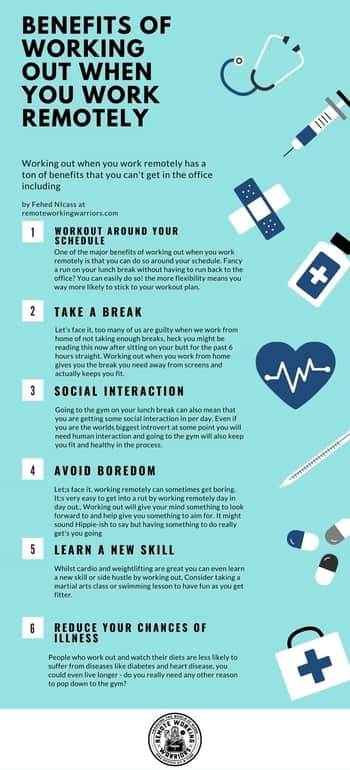
Roles
With the advent of technology and the internet bringing people closer together than ever before the amount of roles that people can do when working from home is expanding rapidly with professionals like sales, accounting programming video editing or anything that requires access to a computer now easily adapting to the new world of work.
Whilst traditional offices are more than capable to let their employees do the roles they are specified it does not offer a degree of flexibility.
For example a line manager on a manufacturing line will need to be present in order to do their role and so may be at more risk if technology changes.
It’s also worth noting ( and we will cover this later) that digitalisation will lead to the loss of some jobs in the transport and manufacturing sector and that people will not be able to adapt to working remotely.
The verdict: Working from an office
The winner
With a clear margin of 5-3 working from home is the better option than working from an office.
The best option to get the most out of your job or employees is a mix between both working from home and an office. Doing so will give your employees the ability to build closer bonds and drive the culture of the business in the days they are in whilst also having the work life balance people crave when working from home
Benefits of working from home
Working from home has a huge number of benefits but the main ones include:
- Increased productivity – remote workers work 16.9 days more than their office based counterparts meaning you will get a lot more done working from home
- In charge of your own schedule – Working from home also gives you the ability to be in charge of your schedule, don’t feel like working 8 hours in one go, then why not take a break, you get the ability to decide.
- Design your own office – working from home allows you to set up your dream office that suits your personality, a fan of superheroes, why not get a batman statue as the centerpiece of your office, it really is your choice and you can design your office for the task or hobbies that you will use it for
- Designated workspace – having a designated home office will allow you to not get distracted. Think about it, working from a living room with a TV or radio it’s only a matter of time before you get the urge to want to watch some. Having a designated office nips this in the bud.
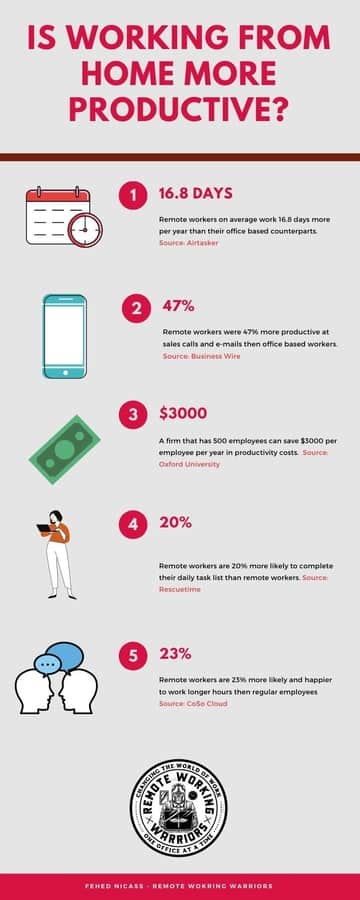
Benefits of working from an office
Now working from an office also has a huge number of benefits which include:
- Better visibility – you are much more likely to be seen by management that you are actually doing something as opposed to working from home where management perception is often less favorable
- Better career aspects – As you are more likely to be seen in the office you are much more likely to have better career prospects then those who work from home permanently. This shows management that you are not difficult to work with and go above and beyond for the business.
- Instant communication – Office workers are much better at communicating than non office workers, being able to have more quality data exchanges and get the answers to their questions much faster based at home.
- Better social interactions – Office based workers will have more social interactions by default helping them improve their well being instead of being stuck in a home by themselves all day.

Drawbacks of working from home
Whilst working from home is an incredible option for many workers it also has quite a few downsides
- Isolation – the biggest problem that remote workers have when working from home is isolation. Around 45% of home workers feel isolated and lonely when compared to only 25% of normal workers
- Lack of boundaries – working from home means that your work and personal life will be merged together and if not managed correctly, you will find that boundaries will start to be crossed, working longer hours and not doing enough to take a break away from work
- Weight gain – being at home means that you will gain weight in the first few weeks as you are at home. It takes a lot of motivation and focus to watch what you eat when you are surrounded from home so ensure you know what you eat.
Drawbacks of working from an office
Working from a traditional office also has quite a few problems including
- Poor work life balance – traditional office based workers don’t have the ability to dictate when and where they work, often having to put their work lives over their personal lives.
- Increase cost – The cost of commenting, get food to eat out ( if you don’t pack your own lunch) and general time lost can all add up to being relatively expensive.
- Less productive – Remote workers are more productive then their office based workers meaning for every day they are working from an office they are losing valuable hours by getting distracted.
Benefits for a company for working from home
The biggest benefits working from home has for an employer are:
- Reduced cost per employee as remote workers often earn less then office based workers
- Cost savings on heating and lighting
- Better employee value proposition making it easier to attract talent in a competitive marketplace
- The ability to attract talent from around the world instead of a specific location
Drawbacks for a company for working from home
Working from home also has a number of problems for companies including
- Lack of commitment from employees as employees will feel less a part of the organisation
- Poor communication amongst all employees by not being in person
- Lack of company culture
Benefits for a company for working from an office
Working from an office also has a number of benefits for traditional work environment
- Better faster communication amongst employees
- A sense of community and culture that employees are all working towards
- A clear separation of work and personal lives
Drawbacks for a company for working from an office
Like everything working from an office also has a bunch of drawbacks:
- It can be incredibly expensive with a lot of hidden costs for employers like heating and lighting
- A weaker employee value proposition with more and more millennials and generation z looking for remote working as an option to consider working from companies
- A fixed location of talent to pick from
Working from home trends
Around 4.7 million remote workers in the Us alone, a figure which has increased by 126% over the past 12 years and is projected to have around 10 million permanent home workers by 2030. By 2075 it’s estimated that the technological shift will be large enough that almost every person in the USA will be able to do their roles remotely, should current trends continue.
To find out more I’ve written a blog post talking all about the future of remote working which you can check out here.
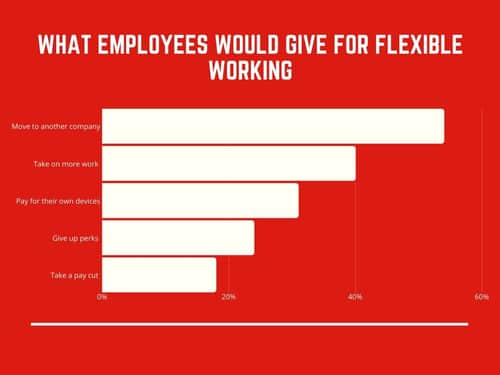
Working from an office trends
Commercial real estate is now amongst the fastest growing type of office space on the market, it is estimated to increase its market share from 5% in 2020 to 30% in 2030. Office leases are also getting shorter down from an average of 15 years to between one to five years.
Office design is also becoming more important with offices using trends like private booths or feature walls engaging their staff when they are in the workplace to match millennials and generation z as they enter the workspace.
What makes a good office environment?
A good office environment is one that has a sense of individuality that is linked to the company’s culture mission and values. It should be brightly lit and avoid things grey or sterile looking paint. Good office environments should also be suitable for all of your employees and their roles.
A few good suggestions would be:
- Having break out rooms where your employees can do quiet work in
- Pain the office the color of your brand
- Have a strong internet connection
- Your values should be clear and present
- A hot desking policy to ensure your employees all mix with each other instead of any formal seating plan.
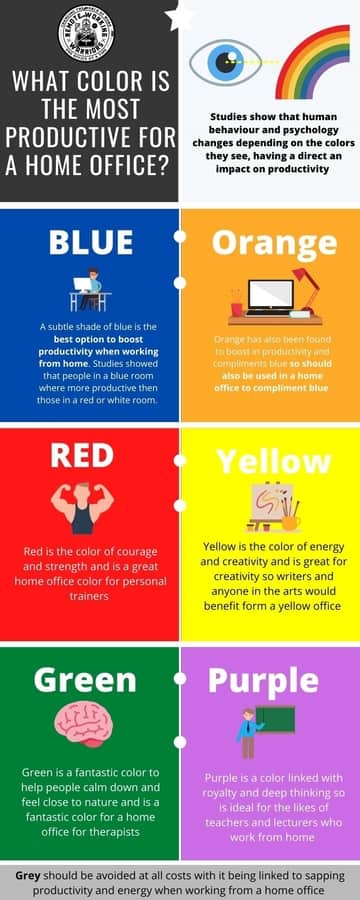
What makes a good work from home environment?
A good work environment allows you to keep focused as you work remotely and avoids external distractions. The best way to do this is to set up a dedicated home office space that you can work in that is full of your character and motivates you. The best room for which will be a loft if you have one which can increase your house price by as much as 20%
Aim to paint this office blue as a way of staying focused ( which you can read up more about here To find out which room is the best for home office check out his post here.
If you don’t have a spare room consider using a corner of your living space that points away from distraction like the TV
Should you set up a home office?
Setting up a home office is the most important thing anyone working from home does to help them excel at staying focused, productive and getting the job done.
In my experience every home office needs the following:
You can find all the products that I think are essential for any remote workers on my recommended gear page here.
What is working from home?
Working from home is a type of flexible work scheme that allows employees to work from home ( or remotely) at least once per week, a few times per week or on a permanent basis. This is done to help employees with their work life balance and help employers attract top talent to their companies.
What is working from an office?
Working from an office is the traditional form of work where employers would expect their employees to commute to a central location to do their job together.
Best practices of working from home?
During my few years remote working I found that the following 5 rules are my go to when working from home. In the roles that I have had these have been universal and can be used by pretty much anyone
- Stop work at your regularly scheduled hours
- Be sure to take regular breaks
- Ensure you get enough exercise and aim for at least 30 minutes every day
- Set up a dedicated workspace
- Inform your boss of what your day looks like every morning
Best practices of working from an office?
Now I’ve also had the pleasure of working from an office throughout my career to and the following rules have served me well:
- Aim to get to your workplace at least 15 minutes before you start
- Communicate and socialise with your colleagues around you
- Make use of the entire office ( use the break out spaces, speak to your managers about what you would like from your office)
- Take shooter frequent breaks away from your screen
- Get an understanding into other peoples roles that are not in your immediate team
What businesses suit working from home?
Any business that is cloud based or needs the internet to function suits working from home.
Ask yourself if the work you do requires you to be in the office and if 95% of your role or bisess can then it’s very likely that you are a good candidate for working from home
So what roles can you do working from home:
I’ve found the following roles are best suits to working from home in particular:
- Sales
- Accounting
- Programming
- Editing and post video production
- HR
- Customer service
- Any other role that is computer based.
That being said with all these roles a degree of social interaction will be missed, for example sales people will not have the ability to bounce off each other HR roles may lose the personal touch if done entirely remotely.
What business suit working from an office?
Businesses that have hardware or require in person interactions are roles that are best suited for an office.
If you are unable to do your job outside the office or if your role is more physical than most then you may need to be working from an office
The following roles are suited to working from an office:
- Teaching
- Engineering
- Therapy
- Healthcare
- Maintenance
Studies on working from home
So this post has been littered with facts but to help explain some of the key studies on working from home I’ve listed them below
| Study | Findings |
| Airtasker | Employees who work from home, work 16.8 days more per year then their office based counterparts |
| Stanford | Employees who worked from home worked one day more per year then traditional workers |
| University of Texas | Blue is the best color to paint your home office which has been linked with further increased productivity. |
Studies on working from an office
| Study | Findings |
| The City | Controlled clear lighting can have a huge impact on employees when working from a traditional office |
| Harvard Business Review | The closer employees are the more they will communicate face to face |
| Harvard Business Review | Open plan offices result in 70% less communication amongst |
How to stay productive when working from home?
Whilst most people working from home won’t have any issue staying productive working from home when compared to working from an office the following are some quick tips to help keep you productive:
- Set up a designated office space
- Ensure you have a strong internet connection
- Journal everyday
- Drink three litres of water per day
- Divide your tasks into projects
- Get dressed every morning
- Do your most dreaded activity first
To read more I’ve written another post. You can find out more about it here.
A lot of people reading my blog want to know what products I recommend for a home office/remote working. You can find out my recommendations here and learn how I make money whilst working remotely on the side here.
The content on this on this site has been written by Fehed Nicass who has over a decades worth of experience in sales and has worked remotely for the past 2 years.
